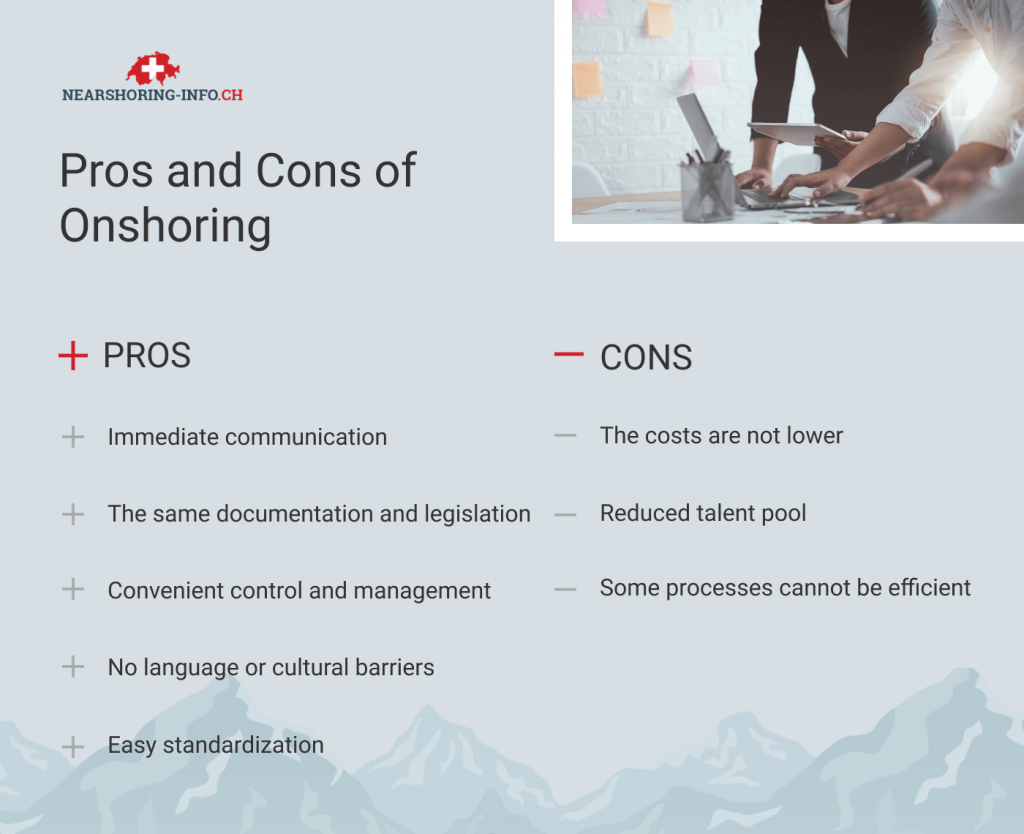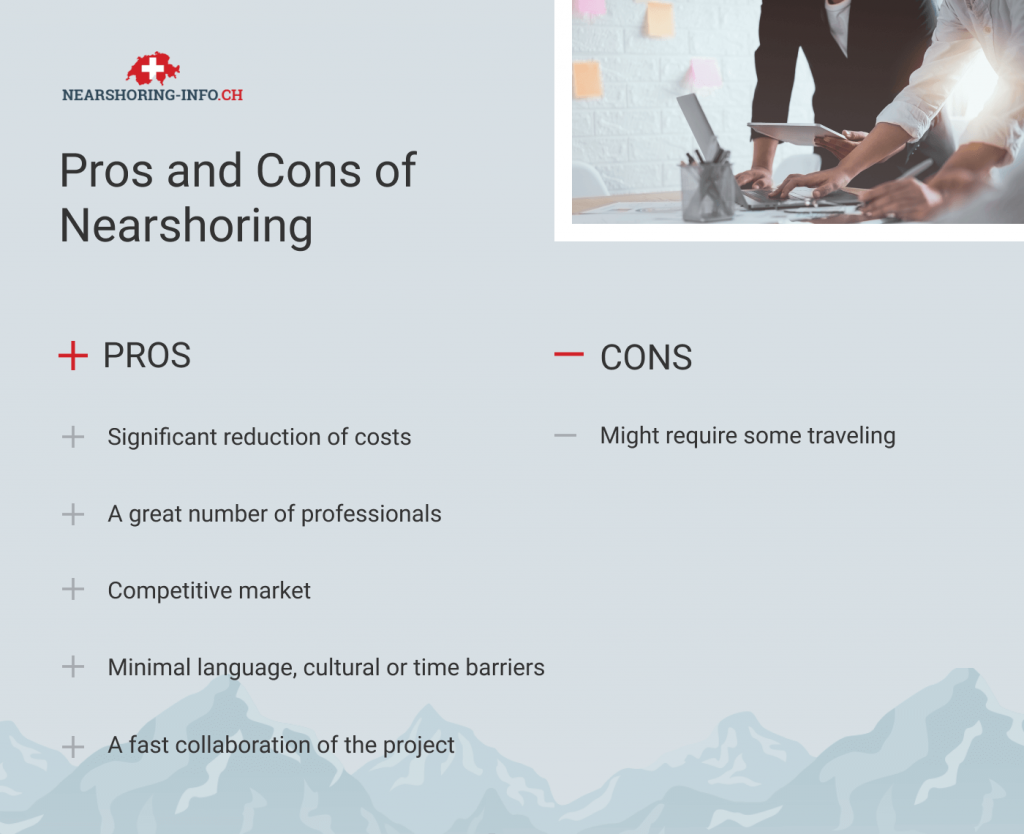Nearshoring is one of the types of outsourcing. It is a practice of moving some business tasks and processes to the other provider or company for mutual benefit. In the case of nearshore outsourcing services, it means delegating these processes to a nearby country, which often shares the same time zone and similar geographical location.
This is the main difference between nearshore outsourcing definition and other types of outsourcing. The principal of delegating the processes in the same for nearshore definition, yet the destination is other – it should be close to the home country. This nearby country often offers high-quality professionals at lower rates, while sharing similar cultural and business values.
Nearshoring Definition and Demand Worldwide and in Ukraine
Outsourcing is a huge part of the IT industry nowadays, as it has significant financial benefits. For example, the global market size of outsourced processes has reached $92.5 billion as of today. Of course, it includes all types of outsourcing, but nearshore software development has grown in recent years and becomes more popular among businesses.
Why nearshore outsourcing is on the rise? Well, because of the advantages this type of outsourcing provides:
- It is cost-effective in terms of lower rates and rental fees, etc.
- Little to no time barriers, the communication can be direct and without any delays.
- Often there is no language barrier, which also makes communication quite efficient.
- It is easy to visit the provider, have a meeting as the destination in a couple of hours of flight – easier management and control.
The nearshoring definition includes overcoming the issues that outsourcing to a distant country provides. What does nearshore mean for the European IT industry? It means that such countries as Ukraine become a beneficial destination for delegating tasks. The local companies are named among the best in the world by The Global Outsourcing 100.
IT market in Ukraine grows faster than worldwide. According to the market overview, only in the years 2016 the workforce number grew by 25%. IT is the third largest export sector in local economy that brings around $4.5 billion per year.
Onshore and Nearshore Outsourcing Definition
Onshore outsourcing definition comes close with nearshore outsourcing definition, but there is a distinct difference. Onshoring means delegating business processes to another company but within the national borders. The similarity to the nearshoring definition is in the search for the closest provider, but without leaving the country.
Onshoring is often used by automated production, where other companies create some supplies. It is beneficial in terms of the delegation of specific tasks to specialized professionals. Companies use it for fast production and high-quality results without starting the on-premise team. However, the main downside is that it is not as budget-friendly as nearshoring.
Onshoring and Nearshoring: Pros and Cons
Now, when an onshoring and nearshoring definition is clear, let’s have a closer look at the advantages and disadvantages of each of them.
| Outsourcing Type | Pros | Cons |
| Onshoring |
|
|
| Nearshoring |
|
|
Onshoring or nearshoring definition does not provide an ultimate choice that suits every company. The particular solution depends on the industry, the task, and requirements.
Nearshore Outsourcing Meaning and Significance for the IT Industry
Nearshore software development definition means delegating programming processes to a close country. This type of outsourcing is specifically beneficial for the IT industry all over the world for several reasons.
First of all, it increases the choice of talents. As a company is no longer limited to one country, it is easier to find high-quality specialists. For example, Ukraine has more than 180,000 IT professionals, which is a great number to choose from. Moreover, nearshore outsourcing can be a strategic advantage for businesses seeking localization or language-related services, for example, Swedish text annotation. Nearshore outsourcing not only offers access to native language proficiency but also cultural insights that are critical in text annotation. Therefore, nearshoring provides an efficient way to manage such intricate tasks without compromising on quality or accuracy.
Secondly, software development offers easy quality control in comparison to the production of material goods. An on-premise team can collaborate in the same environment as the nearshoring team simultaneously. It is easy to control the workflow and results even without physical presence.
Thirdly, it is much more beneficial for cost reduction. It is much cheaper to move processes to a nearby country than to have an on-premise team, especially when it is project-by-project collaboration. And the rates in countries like Ukraine are much lower in comparison to other EU residents, such as the UK, Germany or the Netherlands.
That’s why when it comes to software development; nearshore outsourcing brings almost exclusively advantages for a business.
Benefits of Nearshoring to Ukraine
As it was stated before, Ukraine is one of the top destinations for nearshoring Europe. And here are the main reasons why:
- Convenient location. It is in the center of Europe and it takes 2-3 hours to fly directly from almost any capital of the EU.
- Comfortable time zone. There is little to no difference in time for EU countries.
- Lower rates. The professionals here have salaries that are about 30% lower than their colleagues from other countries. The rent is also cheaper here.
- Competitive market. There is a great talent pool in Ukraine as about 30,000 IT professionals graduate from local universities annually.
- Similar mentality and business values. As it is a European country, there are no significant cultural differences. Ukrainian providers share the same work ethics.
- High level of English among employees. It reduces misunderstanding and makes communication much easier.
FAQ
What is nearshore outsourcing?
Nearshore outsourcing refers to the practice of delegating business processes or tasks to companies in neighboring or nearby countries, typically within the same or similar time zones. This approach provides a balance between cost efficiency and easier collaboration compared to offshore outsourcing, where partners are usually located in distant regions.
What are the advantages of nearshore outsourcing?
Nearshore outsourcing offers several benefits, including:
- Proximity and Time Zone Compatibility: Working with teams in nearby countries allows for real-time communication and collaboration.
- Cultural and Language Similarities: Reduced cultural and language barriers make collaboration smoother and more effective.
- Cost Savings: While not as cheap as offshore options, nearshoring still provides significant cost reductions compared to onshore services.
- Access to Skilled Talent: Companies can access a broader pool of skilled professionals without the high costs associated with local hires.
How does nearshore outsourcing compare to offshore outsourcing?
Nearshore outsourcing typically offers better communication, quicker turnaround times, and fewer cultural and language barriers compared to offshore outsourcing. While offshore options may be cheaper, they often come with challenges like time zone differences and communication issues, which nearshoring mitigates by working with countries in close geographical proximity.
What types of services are commonly outsourced to nearshore partners?
Common services include software development, IT support, customer service, back-office operations, and business process outsourcing (BPO). Nearshore partners are often chosen for these services due to their technical expertise, cost-effectiveness, and ease of collaboration.
What should companies consider when choosing a nearshore outsourcing partner?
Key considerations include:
- Expertise and Skill Set: Ensure the partner has the technical capabilities and industry experience needed for your projects.
- Communication and Language Proficiency: Assess their ability to communicate effectively in your preferred language.
- Cultural Compatibility: Choose a partner with a similar work culture to facilitate smoother collaboration.
- Legal and Data Security Compliance: Verify that the partner complies with relevant legal standards and data security regulations in both countries.
Nearshore Outsourcing Is a Great Investment
Nearshore outsourcing definition is delegating business processes and tasks to other providers, which is located in a nearby country. It is extremely popular as it solves many issues of outsourcing to distant countries, such as time, language, and cultural differences. At the same time, it is beneficial in terms of the greater talent pool and significantly lower disbursements.
























